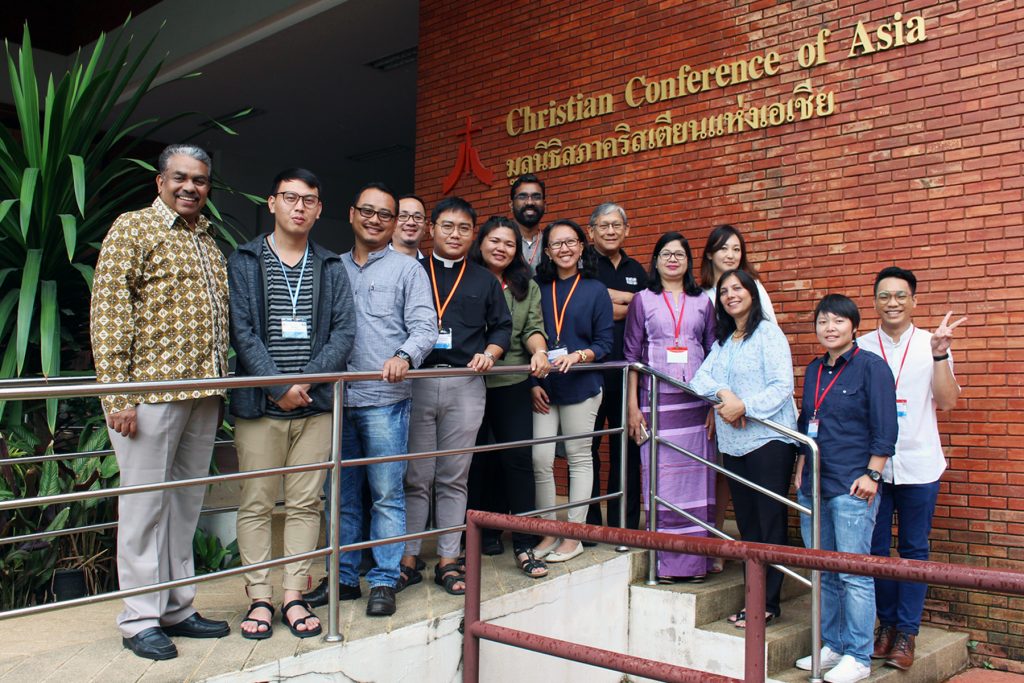Asia Regional Consultation Discusses Church’s Role in Addressing Concerns on HIV/ AIDS, Human Sexuality and Reproductive Health

An Asia Regional Consultation organised by the Christian Conference of Asia (CCA) on ‘HIV / AIDS, Human Sexuality and Reproductive Health’ explored possibilities of creating space for churches in Asia to discuss and be in dialogue with each other on concerns related to HIV and AIDS, human sexuality and reproductive health that include aspects of physical, psychological, social, emotional and spiritual make up of an individual.
Organised as part of CCA’s special programme on Acting Together in Combating HIV and AIDS in Asia (ATCHAA), the consultation held in Chiang Mai, Thailand from 15 to 18 August 2018 brought together representatives of churches and ecumenical organizations from 8 countries in Asia.
The participants who attended the consultation were specially invited from among the churches and related organisations that had experience in addressing the concerns related to HIV / AIDS, human sexuality and reproductive health.
Dr. Mathews George Chunakara, CCA General Secretary in his introductory remarks at the opening session stated that the pandemic of HIV and AIDS has now been recognized as an important issue to be addressed by the churches in Asia even though there had been hesitation by churches when CCA had initiated the work in this area in the early 1990’s. However, a comprehensive framework for achieving sexual and reproductive health and rights, including the prevention and treatment of HIV/AIDS was not on the agenda of churches in Asia due to various reasons.
The CCA General Secretary added, “Asian churches need to address the concerns of widespread HIV/AIDS and its prevention as part of broader questions in relations to sexual and reproductive health as they are becoming more relevant in Asia today”.
Rev. Alfred Candid Jaropillo of the United Church of Christ, Philippines conducted the worship and reflected on the diversity of God’s creation, and how we were beautifully made in God’s image and need to embrace each and every one.
The contextual bible study facilitated by S N Among Jamir of Nagaland Baptist Convention in India highlighted the significance of reading and re-reading the Bible in the current context of inclusivity, welcoming the strangers, and how to be hospitable and not hostile to the strangers and the marginalised in society. .
The presentation on ‘Theological Perspective of Human Sexuality’ by Rev. Stephen Suleeman of Jakarta Theological Seminary in Indonesia reflected on the HIV/ AIDS situation in Indonesia and the need to understand human sexuality and reproductive health in vulnerable situations.
Dr Ronald Lalthanmawia, Coordinator of HIV and AIDS Programme of CCA emphasized that the gamut of the problems related to human sexuality and gender in the medical field needed to be understood in a context that everyone was created differently and it was imperative to have a common understanding amidst all diversities.
Pastor Carlene Nomorosa of the National Council of Churches in the Philippines explained the impact of the negligence in addressing sex and sexuality in society in a proper way which was leading to young people being dependent on information from the wrong sources and developing a misconception about human sexuality.
Dr Sawako Fujiwara from Tohoku Gakuin University in Japan outlined the ecumenical responses on human sexuality over the years and the challenges and good practices of the issue in the context of Japan.
“The ecumenical journey on addressing the topic of human sexuality had been responded to indifferently thus far and so there was a necessity to open-up spaces of dialogue to change the attitudes and perceptions”, added the young woman theologian and academic, Dr. Sawako.
Rev. Fr. Abin Abraham in his presentation highlighted how “a two-fold ministry of empowerment and sensitization has led to the success of the initiative of the transgender project of the Malankara Mar Thoma Syrian Church in India, in which more than 200 Transgender and Intersex were part of the project in Mumbai, India.”.
He expounded the experiences learned and how it was important to empower the churches and the marginalized community as well as the significance of addressing socio-economic needs of the transgenders in society.
Participants pointed out the need to consolidate the efforts of various churches in Asia that had responded positively to the issue and they emphasized upon the importance of creating a common platform to facilitate sharing of resources and mutual exchange of learning.
"There should be a continuous theological reflection in the Asian context and continue to build awareness and sensitize churches and its leadership”, the participants opined.
The consultation identified the importance of recognizing diversities in human sexuality as being part of our lives, reflecting biblically and theologically on the issue, responding positively in creating safe spaces among our communities and reaching out to the affected communities to give them a sense of belonging.
The consultation ended by re-affirming that “we are all created in the image of God with all our inequities and differences. Following the footsteps of Jesus, we are called to prophesy among our brothers and sisters who experience injustices, violence and alienation due to their sexual differences that they should also have the fullness of life.”










